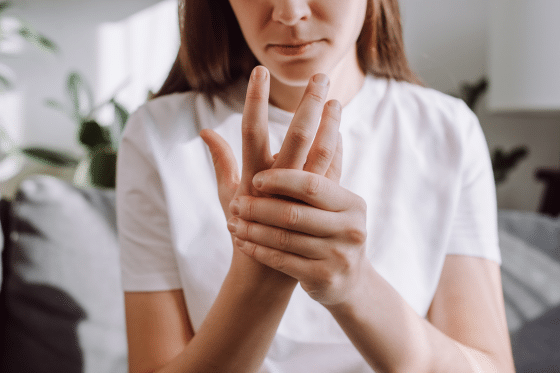Autumn is a season of transition. The long days of summer fade into shorter evenings, the air grows cooler, and the trees turn brilliant shades of gold and red. For many, it’s a time of beauty and reflection, a chance to enjoy walks in crisp air or cosy evenings indoors. Yet for those living with neuropathy, autumn often brings a different story—one of increased discomfort, heightened symptoms, and daily frustrations that make the season harder to enjoy.
If you’ve noticed your neuropathy symptoms becoming worse in autumn, you’re not alone. Tingling, numbness, burning sensations, or weakness in the hands and feet can feel more pronounced as the seasons shift. And while autumn should be a time of comfort and connection, these changes can make everyday life feel more challenging.
In this blog, we’ll explore why neuropathy symptoms can feel worse in the autumn months, what factors may be contributing, and most importantly, what you can do to take back control and protect your quality of life.
What Is Neuropathy?
Neuropathy refers to damage or dysfunction of the nerves, often in the peripheral nervous system. This can lead to a range of symptoms, including:
- Numbness or reduced sensation
- Tingling or “pins and needles”
- Burning or shooting pain
- Muscle weakness
- Balance difficulties
For some, neuropathy is linked to conditions such as diabetes. For others, it may stem from injury, long-term pressure on nerves, or even certain medications. Whatever the cause, the impact on daily life can be significant—affecting walking, sleeping, and simple activities such as gripping objects or standing for long periods.
Why Symptoms Can Worsen in Autumn
Many people with neuropathy report their symptoms feel worse as autumn arrives. There are several reasons this may happen:
1. Cooler Temperatures
Colder weather can make nerves more sensitive, increasing discomfort. Reduced warmth can also cause muscles to tighten, which may worsen the sensation of stiffness or weakness.
2. Reduced Daylight
Shorter days often mean reduced physical activity. Less movement leads to poorer circulation, which can aggravate neuropathy symptoms. Daylight also affects mood and energy—low motivation can mean fewer opportunities to stay active.
3. Lifestyle Changes
Autumn often brings changes in routine. Children return to school, work schedules pick up, and the lead-up to the festive season can add stress. Stress itself can intensify symptoms by increasing tension in the body.
4. Clothing and Footwear
Colder weather means heavier footwear and extra layers, which can sometimes feel uncomfortable for those already struggling with nerve sensitivity in the feet or hands.
5. Emotional Impact
The darker months can bring feelings of fatigue or low mood. When combined with physical symptoms, this emotional toll can make neuropathy feel even more overwhelming.
The Emotional Toll of Neuropathy in Autumn
Neuropathy isn’t just about physical symptoms—it affects the way people experience life. In autumn, when so much of the season is about activity and togetherness, neuropathy can leave people feeling left out.
- Perhaps you avoid long walks with family because your feet feel too painful or numb.
- Maybe you’re hesitant to travel, worried that sitting too long will make symptoms flare.
- Even cosy evenings can be difficult when burning or tingling in your feet makes it impossible to relax.
This sense of limitation can impact confidence, independence, and relationships. It’s easy to feel frustrated, isolated, or discouraged. Yet acknowledging this emotional toll is important—it’s not just about the nerves, but about the life experiences neuropathy interrupts.
Practical Steps to Manage Neuropathy in Autumn
The good news? While neuropathy can be challenging, there are steps you can take to reduce discomfort and feel more in control this autumn.
1. Keep Moving
Movement is vital. Even if it feels easier to stay indoors as the evenings grow darker, gentle activity such as walking, stretching, or low-impact exercise helps circulation and supports nerve health.
2. Stay Warm
Protect your hands and feet from the cold. Warm socks, gloves, and layers can reduce sensitivity and keep blood flowing. Heated blankets or warm baths can also bring relief.
3. Prioritise Foot Care
For those with neuropathy in the feet, proper footwear is essential. Choose shoes that are supportive but not too tight, and check your feet regularly for signs of pressure or injury, since reduced sensation can make it easy to miss problems.
4. Manage Stress
Autumn often feels busy, but stress can make neuropathy worse. Techniques such as deep breathing, mindfulness, or simply taking time out for yourself can help.
5. Nourish Your Body
A healthy diet supports nerve function. Focus on foods rich in vitamins, minerals, and hydration. For those with diabetic neuropathy, blood sugar control is especially important.
6. Adjust Your Routine
Shorter days can limit outdoor activity, so plan movement earlier in the day. Even a 15-minute walk in daylight can boost circulation and mood.
7. Seek Professional Guidance
Physiotherapy can be a powerful tool for managing neuropathy. A physiotherapist can offer exercises to improve strength and balance, advice on posture, and non-invasive treatments to reduce discomfort.
Why Early Support Matters
Ignoring neuropathy symptoms rarely helps. In fact, without support, they may become more intrusive over time. Early action can help you:
- Reduce discomfort
- Improve balance and mobility
- Maintain independence
- Protect quality of life
Physiotherapy takes a proactive approach. Rather than simply masking symptoms, it helps you understand what’s happening and gives you tools to manage it effectively.
Imagine an Autumn Without Limitations
Picture yourself walking through a park carpeted in golden leaves, feeling steady and comfortable. Imagine enjoying an evening by the fire without constant tingling in your feet. Visualise joining family trips or outings without hesitation.
These experiences aren’t out of reach. With the right strategies and support, neuropathy doesn’t have to define your autumn. Instead of focusing on what symptoms stop you from doing, you can start focusing on what you can enjoy.
Final Thoughts
Neuropathy can be difficult at any time of year, but autumn often brings extra challenges. Cooler weather, shorter days, and lifestyle changes can all make symptoms feel worse. Yet there are practical, non-invasive steps you can take to regain comfort, mobility, and confidence.
By staying active, protecting yourself from the cold, managing stress, and seeking professional support, you can reduce the impact of neuropathy and make this autumn one to remember for the right reasons.
If you’ve been struggling with numbness, tingling, or discomfort, don’t wait for symptoms to get worse. Get in touch today to find out how we can support you in moving more freely and enjoying the season with confidence.


